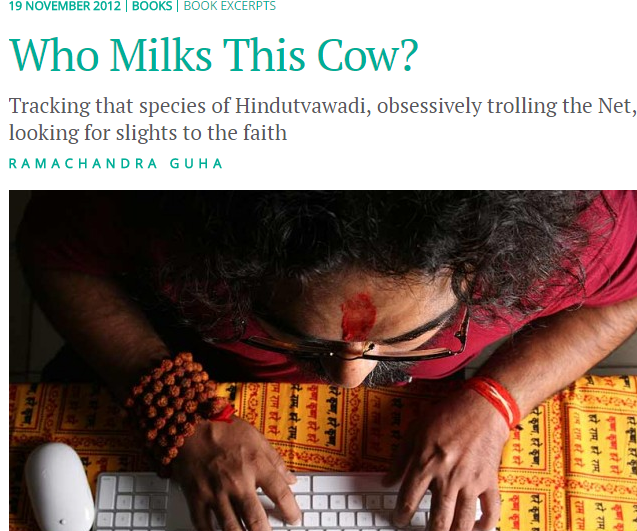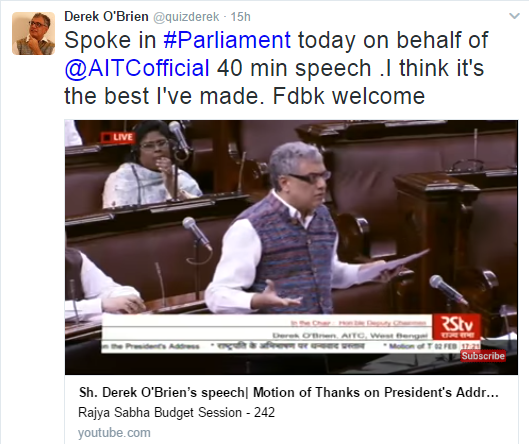A few months back, Rajdeep Sardesai, had conducted a completely lame-duck “interview” of Sonia Gandhi. While India Today promoted it as the ‘Biggest interview of the decade’, it turned out to be the ‘fixed interview of the decade’. Questions were asked to Sonia Gandhi about Indira Gandhi and the various aspects of her life which Sonia remembered with surprising clarity. Rajdeep’s tone and body language remained extremely docile, supportive and probably sycophantic. He even repeated his “fought like a tigress” accolade for Sonia, revealing the tone of the interview.
Come 2017 Rajdeep seems to have repeated this feat with another soft-ball interview. This time it was a PR campaign an interview with the Chief Minister of poll bound Uttar Pradesh Akhilesh Yadav. And to make sure he conveyed the family man image to the masses, Sardesai thought it apt to include Yadav’s wife and kids in the interview as well.
Social media though saw through his act and panned him:
Rajdeep Sardesai asking some hard hitting questions to the CM of a state with the worst Law & Order, inconsistent electricity & water supply https://t.co/iHOiYsjSwh
— The Masakadzas (@Nesenag) February 6, 2017
//platform.twitter.com/widgets.js
Hope @smitaprakash and Arnab learn how to ask tough TOUGH koschans from Rajdeep. Journalism needs TOUGH-Koschan-Askers. https://t.co/HjCuzCkueX
— Ajayendar Al-Sanghi (@ajayendar) February 6, 2017
Meanwhile, a certain Rajdeep Sardesai is asking @yadavakhilesh‘s kids whether they like to go to London 4 a holiday! https://t.co/310iRAuWmC
— Shefali Vaidya (@ShefVaidya) February 7, 2017
.@sardesairajdeep interviewing
1. BJP leaders.
2. Non-BJP leaders. pic.twitter.com/Cl9BGV0gLk— AJ (@DarrKeAage) February 6, 2017
.@dhaval241086 It is like Akhilesh married Rahul and @sardesairajdeep came as part of dowry. Alongwith other paid media.
— Mahesh Jagga (@MaheshJagga) February 6, 2017
Tough hard hitting interview…. @yadavakhilesh must have been shitting bricks. #Presstitution https://t.co/s02lHXtoxY
— Rupa Subramanya (@rupasubramanya) February 6, 2017
Rajdeep asked some tough questions like: “Do you get to go on family holidays”, “favourite vacation spot”, “what is your favourite animal”. In all of this, Rajdeep missed out on the environment of the interview, which was an indoor sports facility replete with all sorts of sports gear, while the average Uttar Pradesh resident is still fighting for the basics.
did @sardesairajdeep ask how many UP kids access the fancy indoor sports gear?easy to play avuncular w/rich politico kids,no?”left” liberal! https://t.co/fmTOiatP2p
— Somnath Mukherjee (@somnath1978) February 6, 2017
In one of India’s most backward and lawless states, CM @yadavakhilesh ‘s kids look like they’re right out of rich American suburbia.Fitting. https://t.co/frKvSg7Uzf
— Rupa Subramanya (@rupasubramanya) February 6, 2017
Many on social media reminded Rajdeep Sardesai of his previous outbursts when he slammed other such “love-fest” interviews:
So dear @sardesairajpdeep were you asking tough question or having love fest with Yadav Parivar?? pic.twitter.com/xs8DPudkHZ
— Dhaval Patel (@dhaval241086) February 6, 2017
Dear @sardesairajdeep yes there are many who haven’t sold out & doing pure journalism.
Unfortunately you are not among them !!!! pic.twitter.com/1bS5fOXuA8
— Dhaval Patel (@dhaval241086) February 6, 2017
Some even pointed out the obvious difference in tone and tenor between Rajdeep’s above “love-fest” and his interview with Smriti Irani:
This joker was questioning Arnab Goswami on his interview with PM Modi.
Look how he is fooling around with Yadav Pariwar !!! pic.twitter.com/aQ28sajaJU
— Dhaval Patel (@dhaval241086) February 6, 2017
Perhaps its time for Sardesai to repeat his tweet from July 2014 once again, this time, targeting himself:



















